The Three Bears
______________________
The Three Bears is a 1946 Bobby Troup composition with original music, and words adapted from the fairy tale The Story of the Three Bears or Goldilocks and the Three Bears, possibly from a rhymed verse form. The song was recorded first by the Page Cavanaugh Trio c. 1946. The trio, with two members replaced, also performed it in the short film Record Party, released in 1947.
A recently popular children’s version, often called “The Three Bears Rap,” was evidently adapted from the 1946 Bobby Troup original. The children’s version, as demonstrated in the arrangements performed by Chali (1986), ZOOM cast members (c. 1999-2005), and various kindergarten groups in videos included below, is a significantly modified adaptation of the Troup song.
(above) The Page Cavanaugh Trio in 1946: l. to r. Al Viola, Page Cavanaugh, and Lloyd Pratt.
Page Cavanaugh Trio
Issued in December 1946 on the 78 rpm single RCA Victor 20-2085, b/w “All of Me” — The single was reviewed in Billboard magazine’s January 4, 1947 issue, on page 20.
.
(below) From the short film Record Party (1947) — This is a different, longer recording than the one above. Of the musicians in the best known Page Cavanuagh Trio lineup, both guitarist Al Viola and bass player Lloyd Pratt are missing from the trio that performs the song in Record Party. I haven’t identified the replacements. The trio of Cavanaugh, Viola, and Pratt are seen in at least two 1948 films, Romance on the High Seas, and A Song is Born (see “Daddy-O” below, from the latter). I notice, however, that the image displayed in the video above for the 1946 single features a contemporaneous trio consisting of Cavanaugh, Viola, and and a third whom I don’t recognize. So that makes at least three different lineups from about the same time that went under the moniker “Page Cavanaugh Trio.”
__________________
Daddy-O (I’m Gonna Teach You Some Blues) – music: Gene de Paul, words: Don Raye
“Daddy-O” has nothing to do with “The Three Bears,” though the style is similar. I just want to show you what the original Page Cavanaugh Trio looks like. The clip is from the film A Song is Born (1948). The song is performed by Virginia Mayo, dubbed by Jeri Sullivan (spelled Sullavan at IMDb), accompanied by the Page Cavanaugh Trio — Page Cavanaugh: piano, Al Viola: guitar, Lloyd Pratt: bass — and an unidentified orchestra.
____________________
More versions of “The Three Bears”
Ray Ellington Quartet – 1948
.
Bobby Troup — from the 1953 LP Bobby Troup!, Capitol Records H-484
.
Leon McAuliffe & his Cimarron Boys
studio recording, c.1957
.
live performance for television, 1957 or 1958 — The clip, or hopefully one of better quality, is available on a DVD titled Hillbillies on TV – The Ozark Jubilee TV Show 1957-58.
___________________________
Chali — solo performance dated 10 October 1986
This represents the earliest instance I have found of the inclusion of cha cha chas in the vocal. The embellishment is frequently heard in later renditions, though its origin is obscure. The video provider describes the performance as an “impromptu rap” by Chali, but it’s evident that she was taught the arrangement, or learned it from some unidentified prior performance or recording.
.
ZOOM cast members — performed during an episode of the second ZOOM TV series (1999-2005)
I don’t know where the tradition of wearing sunglasses, or “shades,” while singing the song began. These props are probably a nod to a style of dress and adornment commonly associated with the bebop era in which the song was written. Perhaps the tradition began in schools or youth camps, where the song is frequently performed by large groups of children. Shades are conspicuously worn by all in the following three videos.
.
SEEC Bears – performed at The Bear Celebration, 24 June 2010
.
Niko and classmates — published on 5 May 2011
__________________
Related, but not incorporating Troup’s song:
Goldilocks and The Three Bears (Bebop’s Fable) — “Adapted, Played and Told by Steve Allen” — issued in August 1953 on the single Brunswick 9-80228, as the B-side of “Cinderella”
.
Goldilox & The Three Bears — from the 1967 Al Jazzbo Collins album A Lovely Bunch Of Al Jazzbo Collins And The Bandidos, Impulse! A-9150 (Mono), Impulse! AS-9150 (Stereo) — Along with playing piano on the album, Steve Allen is credited (on the labels) with composing all of the songs, which is not surprising given that he once publicly proved that he could write 50 songs a day for a week, and claimed, in a 1999 biography & autobiography, to have written over 8,000 songs.
personnel, for the album, include:
Al Jazzbo Collins — voice (spoken word)
Steve Allen — piano, composition
Al Casey, Mel Brown — guitar
Ron Brown — electric bass [Fender]
Hal Blaine, Paul Humphrey — drums
Terry Gibbs — vibraphone
_______________
Ruffus the Dog and his crew rock shades (sunglasses), black turtleneck sweaters, black berets, and goatees, in this episode. Each of theses prop is associated with early bebop fashion. Ruffus the Dog is not to be confused with Rufus the dog of The Muppets. Muppet Wiki says, “Rufus is a fluffy white dog…”








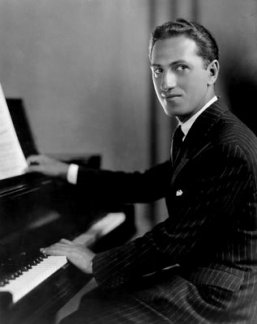

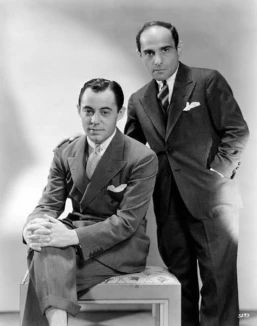

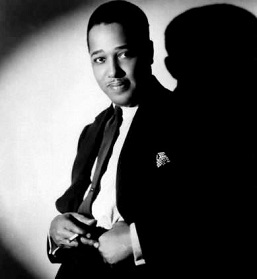


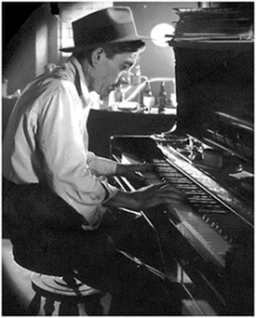
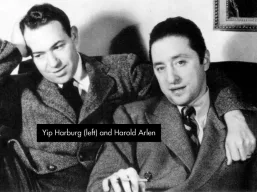
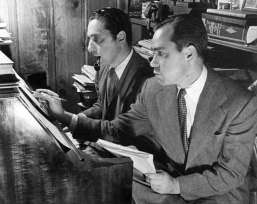



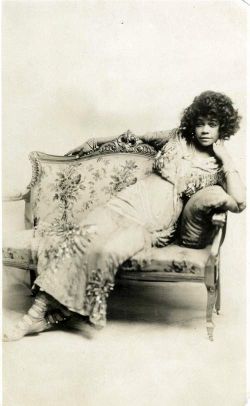





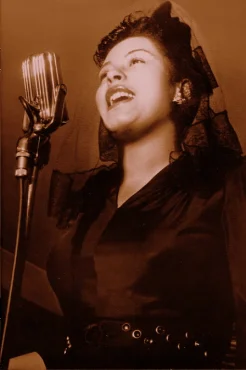




Jul 12, 2018 @ 14:18:19
Where did Bobby Troup get the phrase “Hey, ba-ba-re-bear” from?
See the following:
____________________________________________
E-Bob-O-Le-Bob (Tina Dixon)
The Flennoy Trio, lead vocal by Tina Dixon — recording date unknown; issued in 1945 on the single Excelsior Records FT-130, as the B-side of “I’m For You”
___________________
Tina Dixon with Jimmie Lunceford – recorded on 18 June 1945; issued in July 1945 on AFRS Jubilee 138
recording not yet found
____________________
Ee-Bobaliba (Jim Wynn and his Bobalibans)
Jim Wynn and his Bobalibans, lead vocal: Claude Treiner — issued in 1945 on the 78 rpm single 4 Star Records 1026, as the B-side of “I Want a Little Girl”
.
.
Be-Baba-Leba (Helen Humes)
Helen Humes with the Bill Doggett Octet — recorded in August 1945; issued in September 1945 on the 78 rpm single Philo Recordings PV106, as the B-side of “Every Now and Then”
.
Hey! Ba-Ba-Re-Bop (Curly Hamner, Lionel Hampton)
Lionel Hampton and his Orchestra, vocal by Lionel Hampton — recorded on 1 December 1945; issued in January 1946 on the 78 rpm single Decca 18754, b/w “Slide, Hamp, Slide”
discography sources: Discogs.com, 45worlds.com, 78discography.com, Wikipedia
LikeLike
Jul 21, 2018 @ 21:23:47
LikeLike